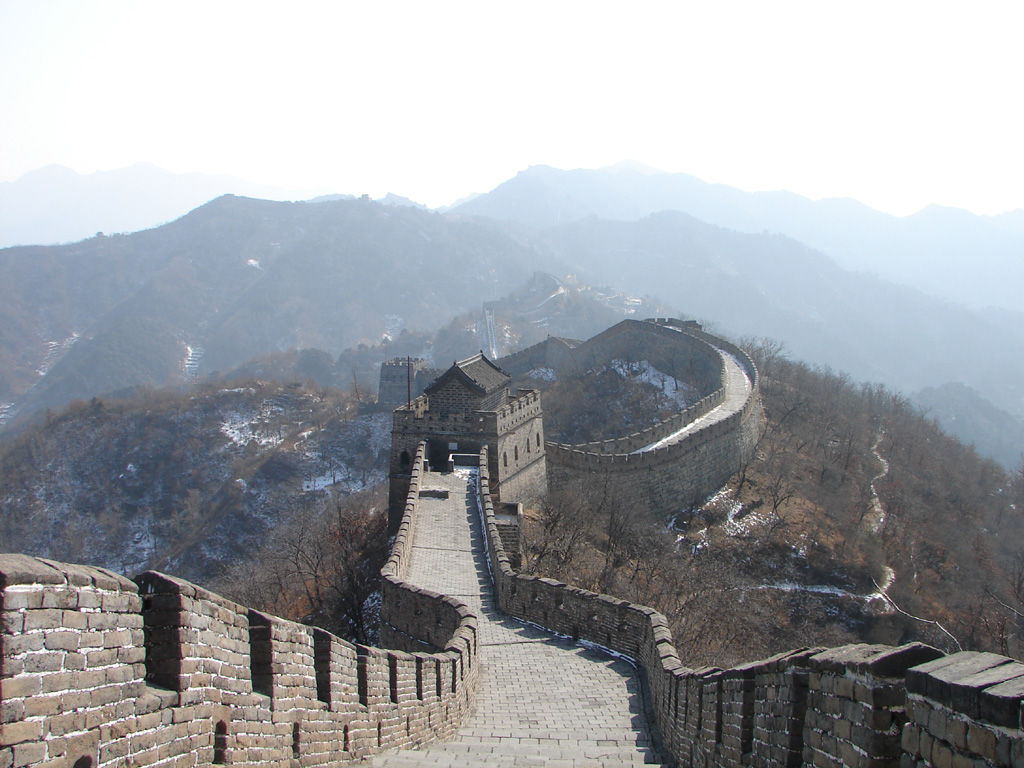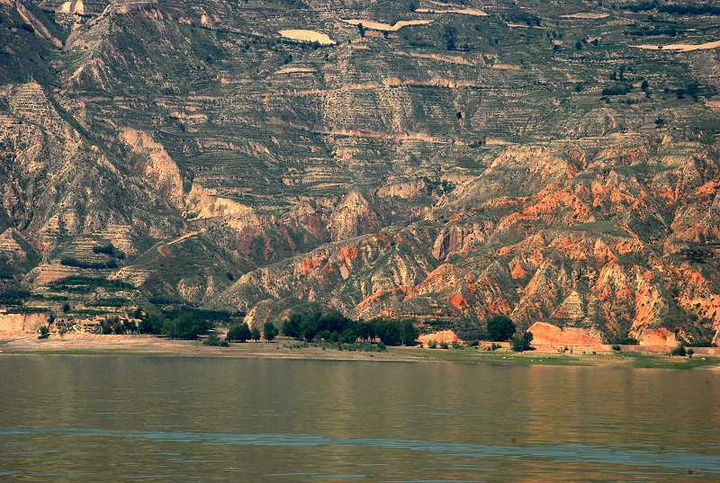|
Great Wall
The Great Wall of China (, literally "ten thousand ''li'' wall") is a series of fortifications that were built across the historical northern borders of ancient Chinese states and Imperial China as protection against various nomadic groups from the Eurasian Steppe. Several walls were built from as early as the 7th century BC, with selective stretches later joined by Qin Shi Huang (220–206 BC), the first emperor of China. Little of the Qin wall remains. Later on, many successive dynasties built and maintained multiple stretches of border walls. The best-known sections of the wall were built by the Ming dynasty (1368–1644). Apart from defense, other purposes of the Great Wall have included border controls, allowing the imposition of duties on goods transported along the Silk Road, regulation or encouragement of trade and the control of immigration and emigration. Furthermore, the defensive characteristics of the Great Wall were enhanced by the construction of ... [...More Info...] [...Related Items...] OR: [Wikipedia] [Google] [Baidu] |
Ming Great Wall
The Ming Great Wall ( zh, c=明長城, p=Ming changcheng), built by the Ming dynasty (1368–1644), forms the most visible parts of the Great Wall of China today. A comprehensive archaeological survey, using advanced technologies, has concluded that the Ming walls measure from Jiayu Pass in the west to the sea in Shanhai Pass, then looping over to terminate in Manchuria at the Hushan Great Wall. This is made up of sections of actual wall, of trenches and of natural defensive barriers such as hills and rivers. While the Ming walls are generally referred to as "Great Wall" (''changcheng'') in modern times, in Ming times they were called "border barriers" (邊牆; ''bianqiang'') by the Chinese, since the term ''changcheng'' was said to evoke imagery of the tyranny of Qin Shi Huang (260–210 BC) and was associated with the Qin Great Wall. History Early Ming walls and garrisons In 1368, the Hongwu Emperor ( Zhu Yuanzhang, r.136898) ousted the Mongol-led Yuan dynasty from ... [...More Info...] [...Related Items...] OR: [Wikipedia] [Google] [Baidu] |
Qin Shi Huang
Qin Shi Huang (, ; 259–210 BC) was the founder of the Qin dynasty and the first emperor of a unified China. Rather than maintain the title of "king" ( ''wáng'') borne by the previous Shang and Zhou rulers, he ruled as the First Emperor () of the Qin dynasty from 221 to 210 BC. His self-invented title "emperor" ( ') would continue to be borne by Chinese rulers for the next two millennia. Historically, he was often portrayed as a tyrannical ruler and strict Legalist, in part from the Han dynasty's scathing assessments of him. Since the mid 20th-century, scholars have begun to question this evaluation, inciting considerable discussion on the actual nature of his policies and reforms. Regardless, according to sinologist Michael Loewe "few would contest the view that the achievements of his reign have exercised a paramount influence on the whole of China's subsequent history, marking the start of an epoch that closed in 1911". Born in the Zhao state capital Handan, as Ying ... [...More Info...] [...Related Items...] OR: [Wikipedia] [Google] [Baidu] |
Canadian Broadcasting Corporation
The Canadian Broadcasting Corporation (french: Société Radio-Canada), branded as CBC/Radio-Canada, is a Canadian public broadcaster for both radio and television. It is a federal Crown corporation that receives funding from the government. The English- and French-language service units of the corporation are commonly known as CBC and Radio-Canada, respectively. Although some local stations in Canada predate the CBC's founding, CBC is the oldest existing broadcasting network in Canada. The CBC was established on November 2, 1936. The CBC operates four terrestrial radio networks: The English-language CBC Radio One and CBC Music, and the French-language Ici Radio-Canada Première and Ici Musique. (International radio service Radio Canada International historically transmitted via shortwave radio, but since 2012 its content is only available as podcasts on its website.) The CBC also operates two terrestrial television networks, the English-language CBC Television and the F ... [...More Info...] [...Related Items...] OR: [Wikipedia] [Google] [Baidu] |
Mongolian Steppe
Mongolian may refer to: * Something of, from, or related to Mongolia, a country in Asia * Mongolian people, or Mongols * Mongolia (1911–24), the government of Mongolia, 1911–1919 and 1921–1924 * Mongolian language * Mongolian alphabet * Mongolian (Unicode block) * Mongolian cuisine * Mongolian culture Other uses * Mongolian idiocy, now more commonly referred to as Down syndrome See also * * Languages of Mongolia * List of Mongolians * Mongolian nationalism (other) * Mongolian race (other) * Mongoloid (other) {{disambiguation Language and nationality disambiguation pages ... [...More Info...] [...Related Items...] OR: [Wikipedia] [Google] [Baidu] |
Tao River
Tao River () is a right tributary of China's Yellow River. It starts in Xiqing Mountains () near the Gansu–Qinghai border, flows eastward across Gannan Tibetan Autonomous Prefecture, and then northward more or less along the border between Dingxi Prefecture-level City in the east and Gannan and Linxia Prefectures in the west. It flows into the Yellow River (actually, the Liujiaxia Reservoir) near Liujiaxia Town (the county seat of Yongjing County), just upstream of Liujiaxia Dam. Hydro power A number of dams with hydroelectric power plants have been constructed on the Tao River. According to Google Maps, they include dams at the following locations (upstream to downstream): * —Gucheng Station, near Zhongzhai Town () in Min County Min County or Minxian is administratively under the control of the prefecture-level city of Dingxi, in the south of Gansu province, China. In ancient times, it was known as Lintao County due to its location along the Tao River. It was fo ... [...More Info...] [...Related Items...] OR: [Wikipedia] [Google] [Baidu] |
China–Russia Border The Chinese–Russian border or the Sino-Russian border is the international border bet |





